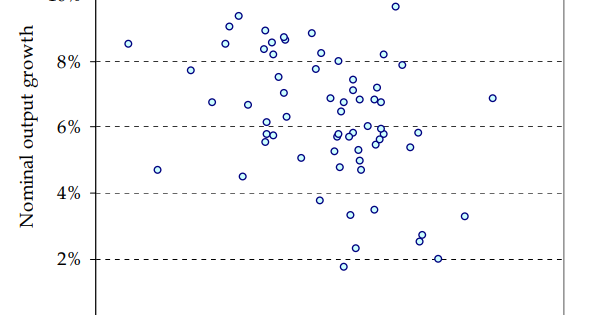
Andrew Sissons
@ACJSissons
Followers
7K
Following
7K
Media
2K
Statuses
15K
Deputy Director for Sustainable Future @nesta_uk. Cover a mix of climate, economics, energy, heating. Ex civil servant, chief economist. Personal account.
Bristol
Joined October 2010
Very excited to publish this: an essay from @antonhowes on energy transitions of the past, with an intro by me. It gives a great insight into how economies can create energy abundance, how it changes lives and how it can be squandered https://t.co/FaktLhyMkV
nesta.org.uk
The transition to using coal and water power can give us some clues about how the switch to clean energy could play out
7
9
38
New personal post - should we give every 18 year old their own plot of land? https://t.co/8Fk4HKPEQn
acjsissons.medium.com
I think this is a bad idea, but I’m going to write it down anyway: whenever someone in the UK turns 18, we should give them a plot of land…
2
3
6
I’m over here now if anyone still wants a random mix of climate, energy and economics stuff. Will also try to post a bit more work stuff on LinkedIn… https://t.co/HiOEJ3YNsI
1
1
3
Update: I have written up the full case for Manchester bidding for the 2036 Games for the @ManchesterMill! Go check it out! https://t.co/q7fvUajlMP
manchestermill.co.uk
The prospect of major international embarrassment may be the best route to government investment
0
1
14
I know this is all contentious, but having one of your biggest airports surrounded by car-choked countryside, having one of your more successful cities constrained to stay fairly small…seems worth fixing to me
0
0
4
But there are also bad reasons it is difficult. The Green Belt is one formidable, entirely man-made barrier. The other is that Bristol airport - and almost all of this scheme - is in North Somerset, not Bristol. Which makes everything much more fraught.
1
0
4
Build a tram to the airport. Build a few thousand homes at every stop. Use the proceeds to help pay for the tram. I know there are good reasons it might be difficult. But afaik a feasible route has been identified (I think to the other side of the reservoirs from my silly line)
1
1
4
Bristol Airport is the 8th busiest in the UK, but has no train or tram link. The parking situation there is mad - the whole area is a giant car park. The Bristol area also needs a lot more homes. If only there was a way to ease both pressures at once…
bbc.co.uk
Residents say they are having to deal with noise and litter from people heading to Bristol Airport.
1
0
10
Here’s the original piece btw And a clarification: Baumol doesn’t just apply to public services, but to any with low productivity growth. “Public services” - like health & education - can be private sector, but still tend to have low productivity growth https://t.co/EbyqUhZP85
acjsissons.medium.com
When productivity rises in one industry, wages rise in all industries. This is one of the most important forces in economics, but it is…
0
0
3
So I think rather than treating taxes as a necessary evil, we should pitch them as a route to get people more of what they want. While focusing relentlessly on public sector productivity, of course. It turns out to be one of the logical conclusions of Baumol for me…
1
0
2
I’ve written about this more airily in the past. When you ask “what would make life better?” in rich economies, I think most of the answers involve more public sector or collective action (health, environment, transport etc.). So probably higher taxes. https://t.co/CoMUytCTM8
1
0
3
Baumol’s “cost disease” only works if demand for lower productivity services is income elastic (we want more as we get richer) and price inelastic (we only want a bit less as prices rise). Vollrath piece here makes this point if you don’t believe me: https://t.co/ljlgDMubJg
1
0
1
That means productivity in public services is important (notwithstanding measurement issues). But it’s also an important point in its own right. If people want more of these services as they get richer, we should give them more of these services. Even if that means higher taxes.
1
0
1
One of the responses to my piece on the Baumol effect was: it means spending more on public services, and therefore higher taxes over time. I think that’s broadly right, but: as our incomes rise, we seem to want more of the types of services often provided by the state
1
0
8
A good post making a really important point: Baumol's so-called "cost disease" is not a disease at all, but the all-important mechanism by which the benefits of necessarily uneven rates of productivity growth in different sectors are spread across the whole economy.
Final plug for my new personal blog. The Baumol effect is one of the most powerful forces in the economy,raising wages for everyone. And yet it is normally described as a “cost disease”, wrongly imo. I think we should embrace the Baumol effect more https://t.co/EbyqUhZP85
2
3
13
Final plug for my new personal blog. The Baumol effect is one of the most powerful forces in the economy,raising wages for everyone. And yet it is normally described as a “cost disease”, wrongly imo. I think we should embrace the Baumol effect more https://t.co/EbyqUhZP85
acjsissons.medium.com
When productivity rises in one industry, wages rise in all industries. This is one of the most important forces in economics, but it is…
5
9
31
Weekend plug for my new personal piece: how one of the most powerful forces in the economy, which raises wages for everyone, got labelled as a “cost disease”. The Baumol effect: not a disease, but something we can use to make people better off https://t.co/EbyqUhZP85
acjsissons.medium.com
When productivity rises in one industry, wages rise in all industries. This is one of the most important forces in economics, but it is…
2
2
5
If you’re a business, the Baumol effect might be annoying because it means higher costs. But honestly, higher wages are a good thing. And have you considered how much weaker demand would be if the Baumol effect wasn’t there to spread the wealth?
1
1
1
Weekend plug for my new personal piece: how one of the most powerful forces in the economy, which raises wages for everyone, got labelled as a “cost disease”. The Baumol effect: not a disease, but something we can use to make people better off https://t.co/EbyqUhZP85
acjsissons.medium.com
When productivity rises in one industry, wages rise in all industries. This is one of the most important forces in economics, but it is…
2
2
5
Just going to put this here once again: How to make the case for higher taxes. (This is going to keep coming up again and again, of course) https://t.co/WhYwRlPrZe
acjsissons.medium.com
How to make the positive case for higher taxes (still) NOTE: This piece has been updated several times, because the UK government still needs to raise taxes. The latest update was on 8th November …
Oof - general expectation in the schools sector was 4/4.5%. Absolutely no way this can be done without additional funding.
1
0
5









